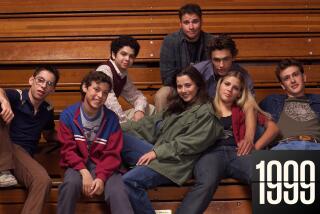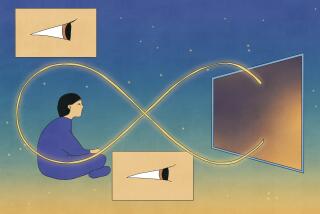‘Futurama’ ends: The Matt Groening interview, Part 2
“Futurama,” the science fiction cartoon, is in the midst of its (putative) last season. (The latest episode, “Calculon’s Immortal Soul,” airs Wednesday on Comedy Central.) On Saturday it convened what will probably not be its final public panel at Comic-Con, San Diego’s world-famous nerd-targeted trade show and fan fair, with the reading of a scene from the upcoming “Last Episode Ever.”
A few weeks back I sat down with Matt Groening, who created the series and developed it with David X. Cohen, for a valedictory interview. As usual, more was said than the print feature could contain, and what follows is some of that. (Not including a long, digressive discussion of the brilliance of “Ozzie and Harriet,” “The Dick Van Dyke Show” and “Green Acres.”)
As we begin, Groening, who also raised the possibilities of a cameo appearance by Jake from Cartoon Network’s “Adventure Time” (voiced, like the “Futurama” robot reprobate Bender, by John DiMaggio) and a “Futurama”/”Simpsons” crossover episode, has just admitted that he is not well-informed on the subject of “Doctor Who.”
RELATED: ‘Futurama’ ends, Part 1 of Matt Groening’s interview
Matt Groening: We have “Doctor Who” references on “Futurama,” but we have a lot of science fiction references that I don’t get; but in the staff we have experts on “Star Trek,” “Star Wars,” “Doctor Who” and “Dungeons and Dragons.”
“Futurama” has its own highly invested and knowledgeable fans, to judge by the online commentary.
MG: There’s some very thoughtful analysis. One of my favorite episodes was called “The Late Philip J. Fry,” in which the Professor invented a time machine which can only go forward in time, and [doofus hero] Fry’s got to meet [one-eyed heroine] Leela for a date, but he can’t stop in the time machine with the Professor, and they shoot forward 10,000 years and he realizes that Leela and everyone they know is dead. And since they can’t go backward they decide to keep going forward in time until a time machine is invented that goes backward. But they go too far, and the world has been completely destroyed. They decide to continue forward to see the end of the universe, which they do -- Bender, the Professor and Fry -- and they crack a beer. And they then they launch and they see the universe begin again, and it turns out it’s a loop, everything repeats, and they go back through time. And the professor leans out the window and shoots Hitler, and they keep going, and they’re coming in for a landing -- and they overshoot it by 3,000 years and have to go all the way around again. And people who know about time travel realize that there’s a paradox -- there are multiple versions of them, so they have to kill their own characters when they return. And fans were very happy that we killed them -- most time travel [fiction] does not acknowledge that there’s a double of the characters.
We had another time travel episode, in which they go back in time and Fry ends up doing the classic thing, which is sleeping with his own grandmother, resulting in his mother -- and that’s why Fry is uniquely, um, immune to certain things that happen in the future.
So you get analytical letters from fans.
MG: Very analytical. Some are very appreciative, some annoyed at the inconsistencies - because there is inconsistency. How do you get around the universe that’s so huge? Originally we planned to have the spaceship powered by the MW drive, which is “magic wand” -- all science fiction has that magic wand where you can travel through galaxies very quickly. And, instead David had a friend who had a theory that you could slow down the speed of light and therefore make things faster. I never understood it, but that’s what happens. And the ship is fueled by dark matter, whatever that is. Again David Cohen could explain, as could all the writing staff, except me.
The writers take the science seriously.
MG: We did an episode when they first went to the moon and [there was the question of] where does the sun set when you’re on the moon. and we tried to make it geographically and chronologically correct. And every so often we put little signs on there for sticklers, “Lunar excursion model replaced in 2020” -- because it wouldn’t be there.
Given the possibilities built into its premise, “Futurama” seems paradoxically more consistent within its world than “The Simpsons.”
MG: Well, I always says that “Futurama” is real and “The Simpsons” is fiction.
There was a point in “The Simpsons” early on where you did watch with some investment in the relationships between the characters -- how they were getting along. That’s been tossed out.
MG: With “The Simpsons” they used to worry about money -- the characters were scrimping to get by, and Homer actually had to get up in the morning and go to work. And now he’s wherever we want him to be for whatever reason at any time. Occasionally we make a joke that he’s missing work, but often he’s wandering around like Ozzie. And I think that that was one of the reasons for the success of the show, because it was such a traditional sitcom template of the family, so you know where the kids are supposed to be in the morning -- eating breakfast, catching the school bus, going to school -- and where Homer was, at work, and Marge raising Maggie at home. That gave the show a foundation. And after years went by and we’re trying to surprise ourselves and the audience, the show got wilder and wilder; I don’t think it would have worked if we had just stayed the way it was at the beginning. People loved those original shows, but I don’t know if they would have loved it for 25 years.
Because at some point you would have had to account for the fact that 25 years have gone by.
MG: Well, “Futurama” started with Fry getting frozen on New Year’s Eve 1999 and waking up 1,000 years later, and then as it’s gone forward in time, we’re in 3013 now. And on the other hand, the characters haven’t aged!
PHOTOS: Celebrities by The Times
Did you draw the original character models?
MG: David and I talked about all the characters and worked together. My drawing style is actually pretty simple and crude -- I can’t draw beautiful women, not even beautiful cyclops women -- so I turned my drawings over to real artists and let them make them better, and then I took those drawings and messed with them. There’s nobody who’s really sexy on “The Simpsons,” but I learned that the animators could draw women in the “Simpsons” style who looked beautiful -- which was a great surprise to me! So I wanted to see if I could create a science fiction heroine -- except I wanted to mess with the fanboys, so I gave her one eye. The original Leela was far more conventionally sexy, in cartoon form. There’s something about cartoonists and animators when it comes to drawing beautiful women they give them noses that are microscopic, and I gave her a nose more like Olive Oyl’s, more in that direction. The animators were aghast at this revolting horror character -- you don’t even notice it now. You probably can’t even picture it, it’s just a nose. And then she was dressed like Ripley from the first “Alien” movie.
With “Futurama,” I wanted to do unrequited love, and David Cohen agreed, and although our original plan was never to have Fry and Leela get together, we finally just said, “You can only string the fans along so far.”
It’s a great collection of characters.
MG: And a great bunch of actors. That’s one of the reasons why, if the show does go away, I’m going to miss it so much, because everybody on it has a really great time; There’s a camaraderie that is unlike anything else I’ve ever experienced. The animators are in love with the show, the actors are in love with the show, and always show up for Comic-Con -- and you can see how much fun people are having, especially John DiMaggio who plays Bender, and Billy West, who plays a million characters.
I’m very proud of Bender, because you believe he’s real -- I don’t know why a robot would behave that way or why they would allow it -- but he’s definitely autonomous, or almost autonomous. One of the things that makes me laugh the most is that Bender cannot be accused of being a bad role model, because he’s a robot -- he gets to smoke cigars and say outrageous things.
David thought it would be funny to have a robot that could only stay sober by drinking -- if he doesn’t drink he exhibits the symptoms of drunkenness, including a rusty beard overgrowth. Also magnets make him turn into a folksinger. There was a whole thing at the beginning that he was a cook with no sense of taste, but that got old very quickly. I think he’s our Homer character -- Fry’s a little too wimpy.
What did John DiMaggio bring to him?
MG: Well, first of all , it’s really hard to cast a robot voice; everybody came in and talked robotically or did an imitation of C-3P0, or they did Hal. David Cohen tried out for the part, because some people think his voice sounds somewhat robotic, and he was too good. So. we couldn’t use him. And John came in and did it as a kind of aggressive barfly -- and that’s it. That really dictated where we were with the character.
PHOTOS: Hollywood Backlot moments
With animation because you can draw anything and do anything and have the characters do whatever you want the tendency is to be very loose with the boundaries and the rules. But what’s great about all these different [cartoon] shows that are on now is they all have their own rules and they stick to them. And in my opinion the ones that don’t make it, the ones that fall by the wayside, are the ones that aren’t aware of that idea, that you have to have your own rules and boundaries. If anything is possible then I think the audience doesn’t care.
With “Futurama,” I was just worried that somebody would beat us to it; it seemed so obvious that there should be an animated science fiction show set in the future. And one of the reasons why it’s not, I learned, is that it’s really really difficult. Science fiction as comedy is tough to pull off, because so much science fiction is about genre and less about character. Which is one of the traditional criticisms of science fiction, that it’s weak on character. The jokes are just a little harder [to write].
We have a bunch of things that we never got around to, I wanted Bender to pull the ultimate caper, he’s somehow going to sneak into heaven and rob God’s treasure.
God seems a funny thing to bring into science fiction.
MG: We have seemingly portrayed God on the show as a disembodied voice -- we had an episode where Bender gets shot out into space out of a torpedo tube and a little civilization grows on his body and they think he’s God. And at the very end, I think, there’s a disembodied godlike voice, who many people interpret as being God. But I think we say that it might possibly be a rogue robot satellite that thinks it’s God.
More to Read
The complete guide to home viewing
Get Screen Gab for everything about the TV shows and streaming movies everyone’s talking about.
You may occasionally receive promotional content from the Los Angeles Times.







